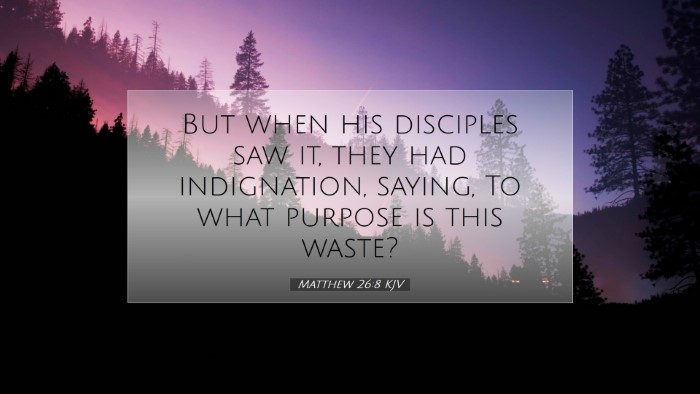Commentary on Matthew 26:8
In Matthew 26:8, we encounter a moment of great significance in the narrative of Christ's final days leading to the crucifixion. The verse states:
"But when his disciples saw it, they had indignation, saying, To what purpose is this waste?" (Matthew 26:8, KJV)
Contextual Overview
This verse occurs in the context of a poignant episode where a woman anoints Jesus with costly perfume. The materiality and symbolism of the act evoke strong reactions from those present, particularly the disciples. Understanding the complexities of this passage necessitates delving into the cultural, theological, and practical implications surrounding the characters involved.
Insights from Commentaries
Matthew Henry's Commentary
Matthew Henry emphasizes the extravagant nature of the woman’s act. He suggests that the costly perfume, valued at a year's wages, represents her profound devotion to Christ. The disciples' rebuke underscores a common human tendency to evaluate acts of worship through the lens of financial practicality.
Henry notes that the disciples' indignation reflects a disconnect between spiritual priorities and material considerations. They failed to recognize that the true value of the woman's actions transcended monetary appraisal. This serves as a reminder of the importance of heartfelt worship over mere economic rationality.
Albert Barnes' Commentary
Albert Barnes provides a detailed examination of the disciples' reaction. He points out that the word "waste" reflects their perspective on resources, driven by a utilitarian view largely influenced by their socio-economic background.
Barnes argues that the disciples' indignation foreshadows a prevalent attitude in contemporary society, where the value of worship can often be questioned by practical minds. He highlights that true appreciation of Christ’s worth cannot be quantified merely by financial measures. The anointing signifies an understanding of Jesus' impending sacrifice, which the disciples struggled to comprehend.
Adam Clarke's Commentary
Adam Clarke discusses the cultural and theological implications of the act of anointing. He underscores that such acts were often reserved for kings and the deceased, thus presenting a dual significance: honor and foreshadowing. Clarke sees this act as a prophetic declaration of Jesus’ impending death and burial, thus highlighting its deep spiritual meaning.
Clarke highlights the irony in the disciples' response; they aimed to uphold a form of stewardship but neglected the deeper spiritual message. His insights suggest that the church today must guard against a similar oversight, where the heart of worship is misconstrued by rigid financial sensibilities.
Theological Implications
The reaction of the disciples prompts reflection on the tension between religion and practicality. This incident reveals different ways believers can perceive value in worship and service.
- Prioritizing Worship: The woman’s action exemplifies a heart fully devoted to God. In contrast, the disciples highlight a habit of assessing worship based on material gain.
- Understanding Sacrifice: The extravagant act points towards Jesus’ own forthcoming sacrifice. It challenges the audience to recognize that worship often involves personal sacrifice which may not always be practical by societal standards.
- Divine Perspective on Value: God's valuation of acts of devotion is often misaligned with human valuation. This raises questions about how the church appreciates and fosters worship in contemporary contexts.
Practical Applications for the Church
Reflection upon Matthew 26:8 can yield significant lessons for the church:
- Encouraging Generosity: Just as the woman gave generously, churches should encourage members to express their worship through acts of generosity that reflect their devotion.
- Valuing Worship Above Economics: Local congregations should prioritize worship practices that may not always fit within tight budgets but resonate deeply with the community’s faith journey.
- Teaching about Sacredness of Sacrifice: Sermons and discussions should address the concept of sacrificial love, drawing parallels from this narrative to contemporary life.
Conclusion
Matthew 26:8 provides fertile ground for theological reflection and practical application for today's believers. By engaging with the insights of esteemed commentaries, it becomes clear that the narrative not only critiques a misunderstanding of worship's value but also challenges the church to reassess its priorities concerning devotion to Christ.
As pastors, students, theologians, and scholars explore this passage, they can find profound implications that inspire deeper worship, appreciation of Christ, and a heart for sacrificial giving that honors God above all else.


